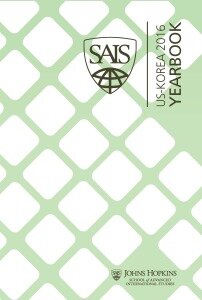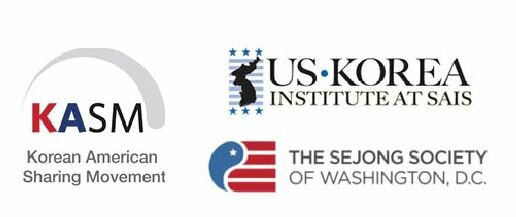Published on January 24, 2017
 The 2016 Edition of the SAIS U.S.-Korea Yearbook analyzes important developments in North and South Korea that characterized their relations in that year. Each paper was written by a SAIS student from the course “Korean Reunification and Asian Regionalization: Challenges and Prospects,” offered in the 2016 spring semester. Their insights were based on extensive reading and study as well as on numerous interviews conducted with government officials, scholars, NGO workers, academics and private sector experts both in Washington and Seoul.
The 2016 Edition of the SAIS U.S.-Korea Yearbook analyzes important developments in North and South Korea that characterized their relations in that year. Each paper was written by a SAIS student from the course “Korean Reunification and Asian Regionalization: Challenges and Prospects,” offered in the 2016 spring semester. Their insights were based on extensive reading and study as well as on numerous interviews conducted with government officials, scholars, NGO workers, academics and private sector experts both in Washington and Seoul.
Student authors featured: Christine Brown, Jaehan Park, Stephanie Faulkner, Yunping Chen, Han May Chan, Emily Potosky, David J. Jea, Maggie Yuan Yao, Crystal Styron, Ashley N. Patton
Read and download the full report here: 2016 SAIS US-Korea Yearbook
Learn more about the Korea Studies Program at SAIS.
Published on October 17, 2016
Commander Fredrick “Skip” Vincenzo, USN
EXECUTIVE SUMMARY
“Deterrence works, until it doesn’t.”—Sir Lawrence Freedman
The United States’ current approach to North Korea does not fundamentally resolve the risks of its belligerent behavior nor halt the development of its nuclear weapons and ballistic missiles. As these capabilities are improved, there is greater potential that Kim Jong-un, the leader of North Korea—confident he can deter a regime-threatening reaction—will attempt a violent provocation to achieve political objectives but in doing so miscalculates and instead sparks a crisis which escalates disastrously. While the United States has contingency plans for a wide range of conflict scenarios, executing them would be extraordinarily costly—the military capabilities Pyongyang has now amassed would inflict catastrophic damage.
James Clapper, the U.S. Director of National Intelligence, has repeatedly warned that Pyongyang is “committed to developing a long-range, nuclear-armed missile that is capable of posing a direct threat to the United States…” and that “North Korea has already taken initial steps toward fielding this system…”1 With such a capability, Kim is attempting force the international community to accommodate him to avoid conflict. However, he could underestimate U.S. resolve, which in turn would ignite conflict. If the Kim regime falls, a nuclear-armed, fragmented military could strike the United States.
Click here to download the full report.
Published on July 13, 2016
Wednesday, Jul 13, 2016 – One Korea Forum
Published on June 27, 2016
One Korea Forum
The Power of Freedom in Addressing the Divided Korean Family
Empowering the Voice of North Korean Defectors
Wednesday, July 13, 2016
10:00 AM – 12:00 PM
Johns Hopkins SAIS, Kenney Auditorium
1740 Massachusetts Ave, NW
Washington, DC 20036
To RSVP or learn more about this event, please visit: https://uskoreainstitute.org/events/OneKoreaForum
Click here to watch the webcast
Published on July 2, 2015

The U.S-Korea Institute at SAIS, the Sejong Society of Washington, DC , and the Korean American Sharing Movement (KASM) invite you to participate in a unique opportunity to engage with North Korean defector students. The students currently attend universities in South Korea and are visiting Washington, D.C. to participate in the 2015 Washington Leadership Program organized by KASM.
This simulation assumes reunification has already occurred on the Korean Peninsula. Sejong Society and KASM participants will be divided into five groups representing a specific issue within a unified Korean government: Education, Internal Security, Foreign Affairs, Economic Development, and Domestic Politics. Each group will be responsible for identifying various problems and challenges that a unified government might encounter, propose solutions, and present their final ideas to all participants. In the RSVP form below, please indicate your two preferred groups.
This event will allow participants to experience first-hand the unique challenges involved in building a new society through integration and careful planning, and to learn strategies for building consensus.We encourage innovative thinking in developing solutions to potential challenges in a post-reunification scenario.
Friday, July 10th
6:00 – 8:30 p.m.
Room 500
Bernstein-Offit Building,
Johns Hopkins SAIS
1717 Massachusetts Avenue NW
Washington, D.C. 20003
Light dinner will be served 6:00 – 6:30 p.m.
Please RSVP here: https://uskoreainstitute.org/events/solutions/
Published on November 12, 2014
The US-Korea Institute at SAIS is seeking program and research interns for immediate hire and for the upcoming spring semester. Multiple positions are open, duties will vary. Current areas of research include: North Korea political, economic, and social development, North Korean WMD issues, US-ROK nuclear cooperation, US-ROK cooperation in Southeast Asia, US-ROK cooperation nuclear security, US foreign policy to both Koreas, energy security cooperation in Northeast Asia, ROK renewable energy policies, and more. Candidates with a background in security and Asia issues preferred for immediate open positions.
Interns generally are asked to do a variety of tasks including research assistance, event attendance and reporting, logistical support for events and projects, and other things as necessary. They may work with USKI staff and/or Visiting Scholars on various projects.
Successful candidates should have an interest in Korea and/or East Asia policy and be at least a sophomore in college or higher; graduate students and post-grads are encouraged to apply. Foreign language skills are a plus, but not necessary. Strong writing and editing skillls are preferred. Must be able to multitask, prioritize, meet deadlines, and work well both independently and in small groups.
USKI internships are unpaid and interns are expected to work at least 4 days a week.
To apply, please email cover letter, resume and short writing sample to Jenny Town, Assistant Director at jtown2@jhu.edu. Only those chosen for interview will be contacted. No phone calls please.
 The 2016 Edition of the SAIS U.S.-Korea Yearbook analyzes important developments in North and South Korea that characterized their relations in that year. Each paper was written by a SAIS student from the course “Korean Reunification and Asian Regionalization: Challenges and Prospects,” offered in the 2016 spring semester. Their insights were based on extensive reading and study as well as on numerous interviews conducted with government officials, scholars, NGO workers, academics and private sector experts both in Washington and Seoul.
The 2016 Edition of the SAIS U.S.-Korea Yearbook analyzes important developments in North and South Korea that characterized their relations in that year. Each paper was written by a SAIS student from the course “Korean Reunification and Asian Regionalization: Challenges and Prospects,” offered in the 2016 spring semester. Their insights were based on extensive reading and study as well as on numerous interviews conducted with government officials, scholars, NGO workers, academics and private sector experts both in Washington and Seoul.

